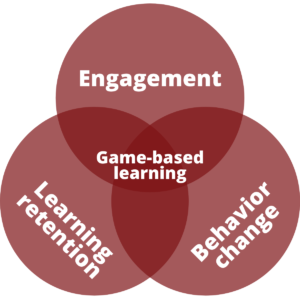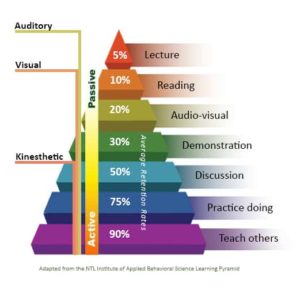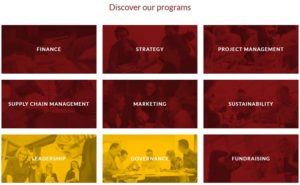Back in 2006, Gartner found that, based on their research, the transfer and application of knowledge can be considerably accelerated using game-based learning. They went on to suggest that enterprises take advantage of games’ scalability and immersive qualities to shorten the time to competency and increase the depth of competency.
In other words, learning by playing is more time-efficient, and enables a deeper understanding and mastery of what is learnt.
Why is game-based learning so relevant?
Gamification in corporate trainings is an important topic because it deals with three major themes for organizations: engagement, behavior change, and learning retention.
 It deals with engagement
It deals with engagement
Engagement is closely related to motivation, and the willingness to do one’s job well. The Cambridge Dictionary defines it as “a process of encouraging people to be interested in the work of an organization […]”.
The game setup is a true enabler to get employees out of their comfort zone and to bond with their team, and to reduce resistance to the content of the program, regardless of whether the attitude is open or skeptical at the start of a program.
Especially the role-play aspect of games can help said employees move out of their limiting beliefs and open up their mind to the knowledge that is being transferred or explored.
It drives behavior change
Behavior change is also a big topic, especially given the pace at which organizations evolve, and the challenges of keeping stakeholders on board, and, again, motivated.
Playing enables behavior change because it takes place in a risk-free environment, thereby allowing participants to try out new things, while creating a situation to which they can easily relate if they choose to, without it to be emotionally overwhelming.
This first-hand experience that participants gather can become a source of inspiration to apply to their own reality.
Besides, in a game setup, people are more prone to authenticity, more eager to provide feedback and guidance to their peers, because playing blurs out workplace politics.
Games are experiences: tapping into them to connect employees with a specific message, or re-creating an environment that is close to reality, will help participants better remember and assimilate the content of the program, while letting them experience how much influence they have on their environment.
It improves learning retention
The last of the three themes game-based learning is intrinsically related to is learning retention. 
The famous learning pyramid ranks how efficient various types of learning are in enabling long-term retention of the knowledge they have acquired.
For example, detailed memories from a book you are reading at the moment will be way more difficult to access in the long run, than memories you created while teaching the same content.
The second-best way to learn things on the longer term is by practicing them first-hand, and this is precisely the core of game-based learning.
Whether game participants are aware or not, they are absorbed into a game which walks them through decisions, processes, situations, which they will face in their real life on the job.
For that matter, it will be much easier for a program participant to remember what they did while playing the game, than remembering something they read about what someone else did in a similar situation.
What game-based learning means for AquaFin
If you are not yet familiar with AquaFin’s approach, our three pillars are
- Learning that makes sense – What this means, is that we focus on teaching concepts and frameworks that make sense for learners, that they can easily understand, and that they can use again in their daily tasks.
- Learning from experts – We only work with experts of the field, that is, professionals who faced challenges and opportunities, and have a track record of how to handle them.
- Learning made fun – Finally, fun is a fundamental for us, and we believe it is also fundamental for a great learning experience.
Concretely, we tap into game-based learning by using business simulations and games in all our training programs: be it finance, marketing, strategy, supply chain, sustainability or even project management.

All games are developed by experts in their respective field and ensure that participants will have fun while learning the right thing.
AquaFin integrates said solutions into a learning journey that brings further value and enable participants to build long-lasting memories while growing their competencies.
If you are curious about how game-based learning works and how we optimize the experience for learners, stay in touch for our next piece on the science behind game-based learning!
You can also contact us to experience our approach by yourself 😊
